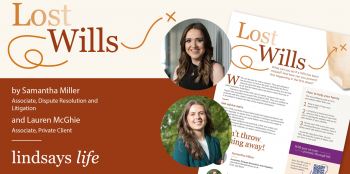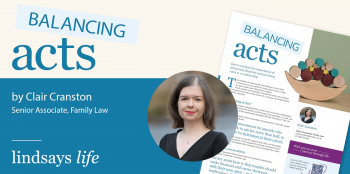What picture does the word “family” conjure up for you? Do you see a married mum and dad, with two children, a dog and a house? Or perhaps your experiences lead you to imagine a totally different picture, where step-children, step-parents and a “blended family” come to mind. The rapid pace at which society is changing has had a substantial impact on the composition of the modern family unit. The family law team at Lindsays see these changes close up, as our cases become more complex and less traditional year on year.
Cohabitation
It is now common place for couples to live together as cohabitants rather than marry and increasing numbers of children are being born to unmarried couples. The law has reflected this shift; the Family Law (Scotland) Act 2006 introduced two main rights which allow applications for financial provision to be made on the death of a cohabitant (in the event that there is no Will) and also after separation. Tight timescales apply for submitting both applications and specialist advice is necessary.
The application of the law in this area is unpredictable, despite the recent Supreme Court ruling in the Gow V Grant case. The upshot is that many of our clients are protecting their interests, by 1) creating or updating their Will and 2) by asking us to draw up a “Cohabitation Agreement” for them which is an Agreement that regulates a cohabiting couple’s affairs.
For example, if one person contributed more to the purchase of a property, the Agreement can state that they will recoup their investment. It can also bar the couple from making claims against each other under the 2006 Act, in effect contracting out” of the legislation.
Adoption
The area of adoption has undergone significant change in recent years. Previously, many babies were adopted at birth, now most children are older and in the care system. The Adoption and Children (Scotland) Act 2007, (in force from 2009) addresses various societal changes. The Act allows unmarried couples, including gay couples, to adopt jointly. It also introduces “permanence orders” – orders which can be granted to secure a child’s long term future with a carer. It is a measure short of adoption, but allows children to feel more secure in their long term foster or kinship care arrangements, as they are released from the uncertainties of the children’s panel system. There is also more support available for those directly affected by adoption. We appreciate the sensitive nature of these cases and are well placed to guide families through the adoption process.
The changing face of the family
We saw the introduction of Civil Partnership for same sex couples at the end of 2005. In July 2012 the Scottish Government announced they are to legislate to allow same sex marriage, although religious bodies who consider that to be contrary to their faith will not be compelled to conduct them.
For a number of reasons, divorce is no longer an unusual occurrence nor carries any social stigma. Indeed, there is discussion in legal circles about whether “adultery” should be removed as a route to divorce, and simply be categorised under the term of “unreasonable behaviour.”
Divorce has a huge impact on the family unit however, as both childcare arrangements and finances require to be agreed. It is unsurprising that we are assisting many of our clients to provide for a “worst case scenario” by drafting Pre-nuptial Agreements, which set out what would happen if the marriage were to end. Whilst it is harder to make plans for childcare arrangements, finances can be determined in advance. Although unlikely to feature in a Hollywood romantic comedy, it is likely that in reality the actors are using Pre-nuptial Agreements to protect their assets.These agreements serve a very useful purpose and allow people to take control of their own destiny’s. As a result of people re-marrying, step-parents are much more common than they were a generation ago. Step-parents looking after their step-children are expected to “safeguard the child’s health, development and welfare”, though they do not have automatic parental rights and responsibilities for them.
These can be applied for at court, or gained if the step-parent adopts the child. Grandparents play an increasingly valued role in the modern family unit. With most mothers returning to work after having children, grandparents now assist with childcare at an unprecedented level. Grandparents do not have any automatic parental rights and responsibilities for their grandchildren, such as the right to contact with the grandchild. If they wish to apply for parental rights and responsibilities, it would necessitate an application to court and the court would have to be persuaded that the order should be granted and is in the child’s best interests.
The global dimension
The world is getting smaller. As people travel and work further afield, it leads to people from different countries marrying, cohabiting and having children together. The difficulties arise if the relationship breaks down; in particular determining childcare arrangements can be very challenging. There have been several “relocation” cases where Scottish judges had to decide whether children should stay in Scotland or be relocated to a different country with one of their parents native to that country. These cases can produce very difficult situations, given that children can end up living on the other side of the world from one parent. Specialist advice is crucial in these cases and we have advised many clients who either wish to contest a relocation application or relocate themselves.
Modern methods of resolution
The family lawyers’ skill set also continues to adapt to the needs of society, having learned from experience how to improve things for families going through a separation. Today’s specialist family lawyers can offer experience and skills in disciplines such as Mediation, Collaboration, Negotiation and Arbitration that can dramatically mitigate the impact of separation and better equip parents to effectively co-parent their children in a manner that will benefit all concerned.








